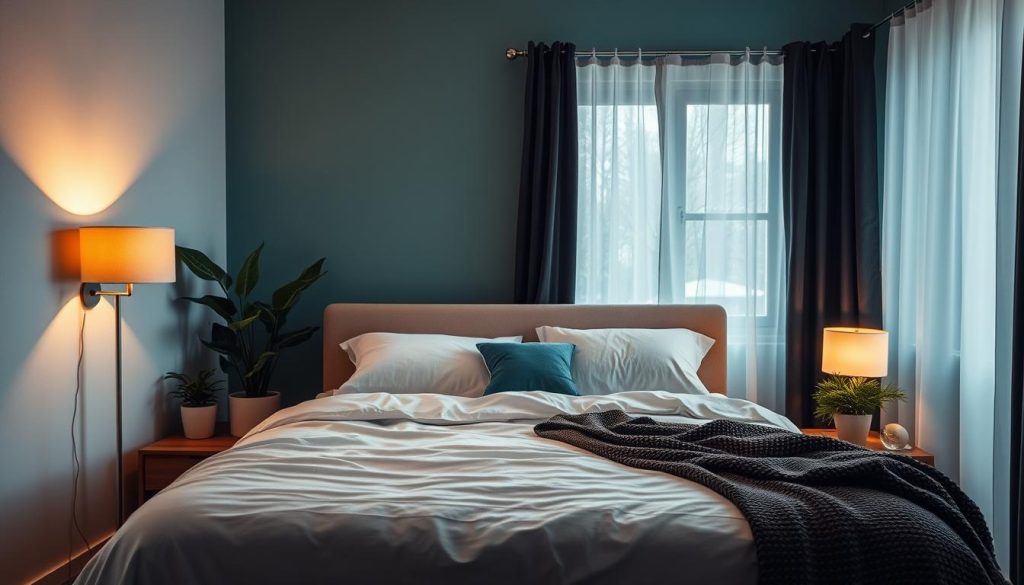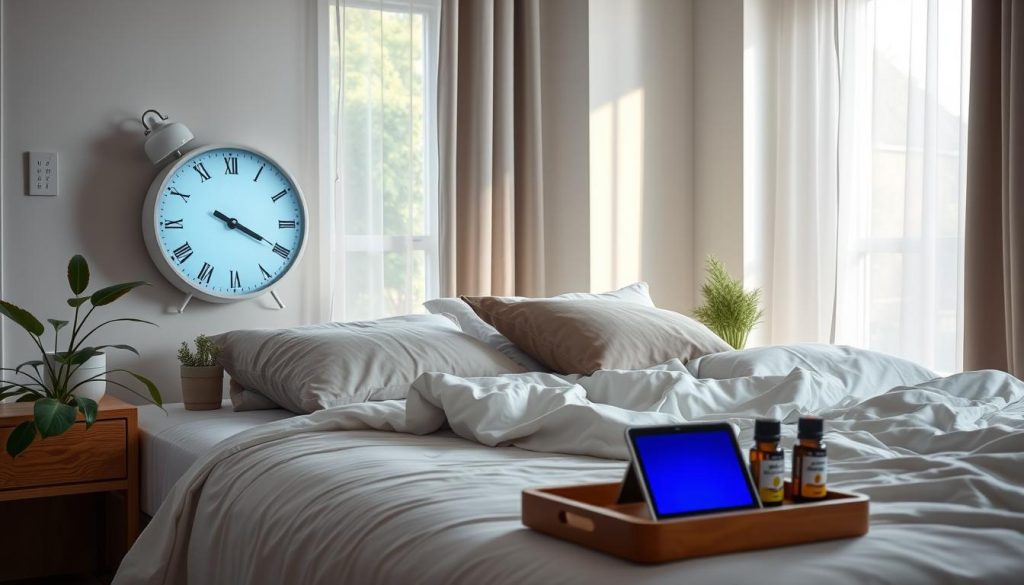It’s important to understand how my circadian rhythm and sleep hygiene work together for better sleep. My circadian rhythm controls when I feel awake or tired, based on light and temperature. Sleep hygiene, on the other hand, is about making my sleep space comfortable.
By knowing my circadian rhythm and practicing good sleep hygiene, I can sleep better. This helps me feel my best every day.
Understanding Circadian Rhythms
Circadian rhythms are key to my biological clock and impact my life, especially my sleep. They help my body get ready for the day and night, making my sleep-wake cycle better.
What Are Circadian Rhythms?
Circadian rhythms are 24-hour cycles that my body follows. They are influenced by light and darkness, telling me when to be awake or sleep. Hormones like melatonin play a big role, helping with functions like metabolism and sleep. Problems with these rhythms can cause sleep disorders, affecting my health.
How Circadian Rhythms Affect My Sleep
My daily activities should match natural circadian rhythms for better sleep. But, using screens at night can mess with melatonin levels, making it tough to sleep. If I don’t sleep well, my body’s clock gets out of sync. Knowing this helps me make better choices for better sleep and health.

The Importance of Sleep Hygiene
Good sleep hygiene is key for restful sleep. It means creating a sleep-friendly environment and sticking to a bedtime routine. I’ve learned that my sleep habits greatly affect my health. Knowing about sleep hygiene helps me choose better sleep options.
What Is Sleep Hygiene?
Sleep hygiene includes habits that help you sleep well. It’s about having a calm sleep space that’s dark, cool, and quiet. Also, a bedtime routine tells your body it’s time to sleep, making it easier to fall asleep.
Key Practices for Better Sleep Hygiene
Here are some ways to improve your sleep hygiene:
- Don’t have caffeine or heavy meals before bed to avoid sleep problems.
- Have a calming routine to signal bedtime, helping your body relax.
- Make your sleep area cozy with soft bedding and reduce noise and light.
- Go to bed and wake up at the same time every day to keep your body’s clock in sync.

By doing these, you not only make your sleep space better but also improve your sleep habits. This is good for your health and well-being.
| Practice | Benefit |
|---|---|
| Limit caffeine intake | Reduces sleep disturbances |
| Create a wind-down routine | Signifies to the body that it’s time for sleep |
| Comfortable sleep environment | Enhances the quality of sleep |
| Regular sleep schedule | Regulates the internal clock |
Balancing Circadian Rhythm and Sleep Hygiene
Understanding the balance between circadian rhythm and sleep hygiene is key for my health. Synchronizing my sleep with my body’s natural rhythms improves my rest quality. Going to bed and waking up at the same time daily helps my body prepare for sleep better.
Good sleep hygiene practices also boost my sleep efforts. I cut down on blue light from screens in the evening. This helps my body know it’s time to relax. I also keep my bedroom quiet, dark, and cool, which is good for my health.
Keeping a steady circadian rhythm and good sleep hygiene together is crucial. They help me sleep better and feel more alert during the day. This balance leads to better well-being, making each night feel refreshing.

| Factor | Impact on Sleep | Importance for Healthy Lifestyle |
|---|---|---|
| Consistent Sleep Schedule | Improves sleep quality and duration | Supports overall physical and mental health |
| Blue Light Reduction | Enhances melatonin production | Promotes a natural sleep-wake cycle |
| Comfortable Sleep Environment | Reduces disturbances during sleep | Encourages restorative sleep phases |
Strategies for Maintaining a Healthy Sleep Schedule
To manage my sleep schedule, I create a consistent sleep routine. This lets my body get used to regular habits. Setting a fixed bedtime and wake time helps regulate my internal clock.
Following a set schedule makes it easier to fall asleep and wake up. This improves my sleep quality a lot.
Creating a Consistent Sleep Routine
Having a predictable sleep schedule boosts my daytime energy. Keeping bedtime and wake time the same, even on weekends, reinforces this routine. This makes me wake up feeling refreshed and ready for the day.
This regularity helps me manage my nights better. It ensures I get enough restful sleep each night.
Adapting My Lifestyle for Better Sleep
Along with my sleep routine, I’ve made lifestyle changes for better sleep. Regular physical activity is part of my daily routine, which helps a lot. Managing stress through mindfulness, like deep breathing or yoga, is also part of my evening.
I’m careful about what I eat before bed. Avoiding heavy meals and caffeine before sleep has helped a lot. These changes help me prioritize sleep and keep a healthy sleep schedule.

